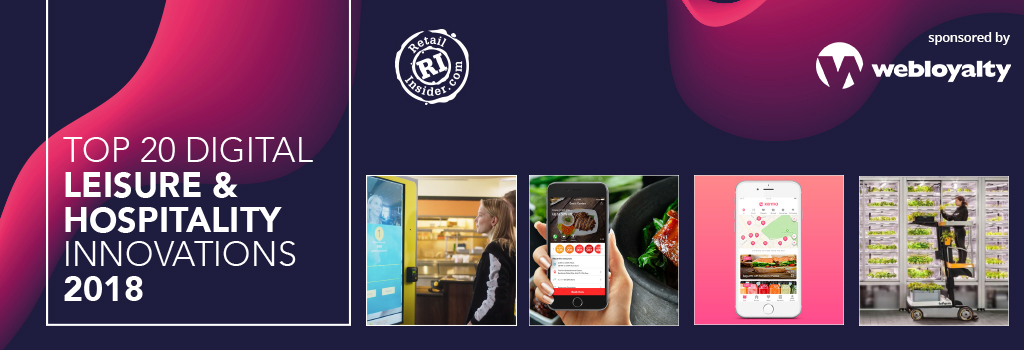Chloe Hall, Marketing Executive for Webloyalty and advocate for sustainable living discusses the increasing trend of sustainability innovation in the leisure and hospitality sector.
It’s clear to me that modern consumers are becoming increasingly aware of their role in generating a more sustainable and environmentally friendly world. According to recent research, a third of consumers are now opting for brands that they believe are doing social or environmental good.
Millennials are a particularly large part of this growing consciousness with “almost three out of four” willing to pay more for sustainable goods. (Including me!) Thus, a growing tide of businesses are responding to the demands of consumers with innovations aimed directly at addressing previous shortcomings.
Here I take a look at three companies from our Leisure and Hospitality Innovations Report 2018, that are pushing the sustainability agenda through technology and innovation.
The app that turns a profit on surplus food
The entry of Karma app has shown immediate results for the restaurant industry. Not only does the app address the issue of sustainability at a time when the UK wastes a staggering 10 million tonnes of food per year (at a cost of £20 billion), but importantly for restaurant owners, the app’s businesses-friendly approach allows them to generate a profit through sustainable practices.
The concept of this Swedish app is simple but effective. Restaurants upload photos of their unsold or soon to go out-of-date food and allow customers to pick it up at specific times. As the food is surplus and close to its use-by date, prices are heavily reduced. This gives customers the chance to enjoy restaurant-quality meals at cut prices.
One of Karma’s key features is that it offers restaurants a ready-made secondary revenue stream. Karma lets restaurants make a small profit from what would be wasted. It’s an approach that is efficient for the business and affordable for the customer.
Free Refills: the food service initiative cutting single use waste
We can all agree that single-use plastic has become a pressing environmental issue over the last few years. While the UK produces 3.3 million tonnes of plastic annually only a fraction of that is recycled.
As many restaurants and outlets have already announced they will ban straws, efforts are now being focused to reduce the 7.7 billion single use plastic bottles the UK throws away each year.
Property company, Landsec, have launched its Refill Me initiative to take the lead in the battle against single use plastic bottles. With a recent YouGov survey finding that 71 percent of consumers are “uncomfortable asking for tap water without making a purchase”, Landsec has partnered with over 90 foodservice brands including McDonald’s, Costa and Pret A Manger to offer consumers free bottle refills without the pressure of making a purchase.
The initiative aims to drive down the plastic bottle waste and shows that businesses have taken note of the public’s opinion on matters that affect us all. Rather than reactively responding to demands of consumers, Refill Me shows that businesses can be at the forefront of sustainable change.
Food Chain Waste Reduction: the Farming of the Future?
Is Infarm the farming method of the future?
This hip, tech-driven Berlin company is pioneering a form of vertical farming – controlled through a cloud – which turns the traditional food production chain on its head. Rather than transporting food into restaurants and food service outlets from the other end of the country, the farm is placed in the retailer’s location. This go-to-market strategy is both convenient and convincing for restaurants and retailers.
On top of the fresh herbs, some fruits and a selection of vegetables that restaurants and retailers will have available to them year-round, Infarm’s technology drastically reduces the inefficiencies and high waste that are part of the traditional farm to plate food chain.
In the UK, over 95 percent of the fruit eaten in the UK is imported from abroad, while 30 percent of all goods transported by lorry in the country are food. In Infarm’s vision of the food future, the end-customer themselves harvests their farm’s produce themselves.
The Tipping Point of Sustainability in Leisure and Hospitality
The simple fact that 340 million plastic bottles would be saved each year if just one in 10 Brits refilled their bottles each week tells businesses that their effort is worthwhile. The growing focus of consumers on environmental issues tells companies that their efforts will make a difference.
Change is happening and it’s really encouraging to see these innovative companies taking a lead in addressing the sustainability issue. It’s clear we have a lot further to go in the fight against an unsustainable and environmentally damaging future. However, the rapid success of early-adopting brands and tech-driven starts ups tell us we are heading in the right direction!
If you want to see who else made the top 20 list of leisure and hospitality innovations for 2018 you can download a copy of the report here.



